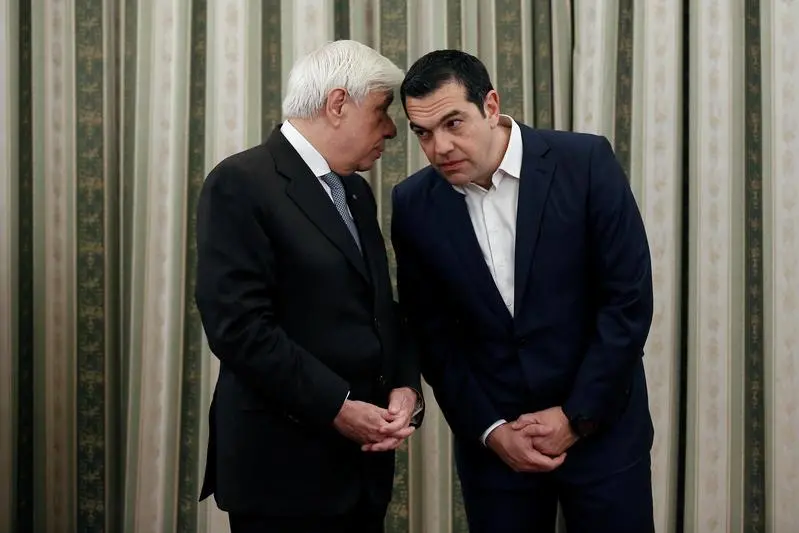PHOTO
BEIRUT: Oil and gas took center stage Thursday with the visit of several high-ranking foreign officials, including Greek President Prokopis Pavlopoulos and the Cypriot foreign and energy ministers. Bilateral agreements with Cyprus must be drawn up quickly so that the drilling of exploratory wells near the Cypriot-Lebanese maritime border can begin, Lebanons Foreign Minister Gebran Bassil said at a news conference Thursday following a meeting he and Energy Minister Nada Boustani held with their Cypriot counterparts, Foreign Minister Nikos Christodoulides and Energy Minister Georgios Lakkotrypis.
In 2020, there could be the drilling of an exploratory well near the Cypriot-Lebanese maritime border ... which means we should speed up the bilateral agreements, Bassil said.
Last week, Lebanon launched the second round of its oil and gas exploration, for maritime Blocks 1, 2, 5, 8 and 10. Blocks 5 and 8 border Cyprus territorial waters, and a source close to the Lebanese Petroleum Administration previously told The Daily Star that Block 5 could potentially contain cross-border deposits.
We agreed to initiate discussions on a bilateral framework agreement concerning the development [of] hydrocarbons resources which cross the median line between our exclusive economic zones, the Cypriot foreign minister said at the news conference, according to a statement from the Lebanese Foreign Ministry.
This framework would provide the much-needed legal certainty for international companies wishing to invest in the regions huge hydrocarbons potential, Christodoulides said.
A statement from the Energy Ministry reported that the team preparing the bilateral framework agreement would release an initial report in June, and the agreement would hopefully be signed by the two countries in September.
The countries additionally agreed to cooperate on the related technical and geological matters and to share expertise on their respective oil and gas legislation.
Lakkotrypis, the Cypriot energy minister, said the two countries also agreed to search for markets for the gas that could potentially be extracted, the Foreign Ministry statement said. After a market is found, the countries will look to prepare an agreement for cross-border infrastructure projects to transport and export natural gas. Christodoulides added that his country will not participate in any project that violates Lebanons rights.
Cyprus supports Lebanons prosperity, he said, emphasizing that regional security was dependent on a strong and secure Lebanon.
Regarding the maritime border dispute between Lebanon and Israel, Lakkotrypis said his country was ready to mediate to find a solution.
Christodoulides later met with Prime Minister Saad Hariri to discuss energy development among other topics, according to a press release from the premiers office.
Also Thursday, President Michel Aoun met with his Greek counterpart Prokopis Pavlopoulos, after the latter arrived for a two-day visit. Aoun said at a news conference after the meeting that Lebanon would continue to refuse to join any forum or cooperation mechanism that includes Israel, including the Eastern Mediterranean Gas Forum.
The forum had convened six countries and Palestinian representatives in Cairo in January in hopes of, among other things, creating a regional gas market that serves the interests of its members by ensuring supply and demand, optimizing resource development, rationalizing the cost of infrastructure, offering competitive prices and improving trade relations, a statement from the Egyptian Petroleum Ministry said at the time.
Aoun also stressed Lebanons right to extract oil and gas present within its exclusive economic zone, part of which lies in waters disputed with Israel.
Pavlopoulos also thanked Aoun for Lebanons efforts in hosting refugees from the Syrian conflict, saying Europe has not been as present as it should [have been] since the beginning of the conflict.
Aoun said he had discussed with Pavlopoulos the pressure Lebanon has felt from hosting upward of 1 million Syrian refugees, in addition to the Palestinians already displaced in the country.
He called for their countries to assume joint responsibility in ensuring the Syrian refugees safe return to their homeland.
Aoun noted the U.S. decision to recognize Israeli sovereignty over the occupied Syrian Golan Heights, saying the potential residual effects of the decision could threaten Lebanons sovereignty as the Jewish state still occupies the Shebaa Farms, the Kfar Shouba hills and the Ghajar village.
The Greek president also met with Parliament Speaker Nabih Berri, who emphasized the importance of maintaining special relations between Greece, Cyprus and Lebanon, a statement from Berris office said.
And in a separate meeting Thursday, Pavlopoulos and Hariri discussed ways to enhance bilateral ties, especially in the economic and tourism sectors, a statement from Hariris office said.
Pavlopoulos is scheduled to depart Friday.
Copyright 2019, The Daily Star. All rights reserved. Provided by SyndiGate Media Inc. (Syndigate.info).





















